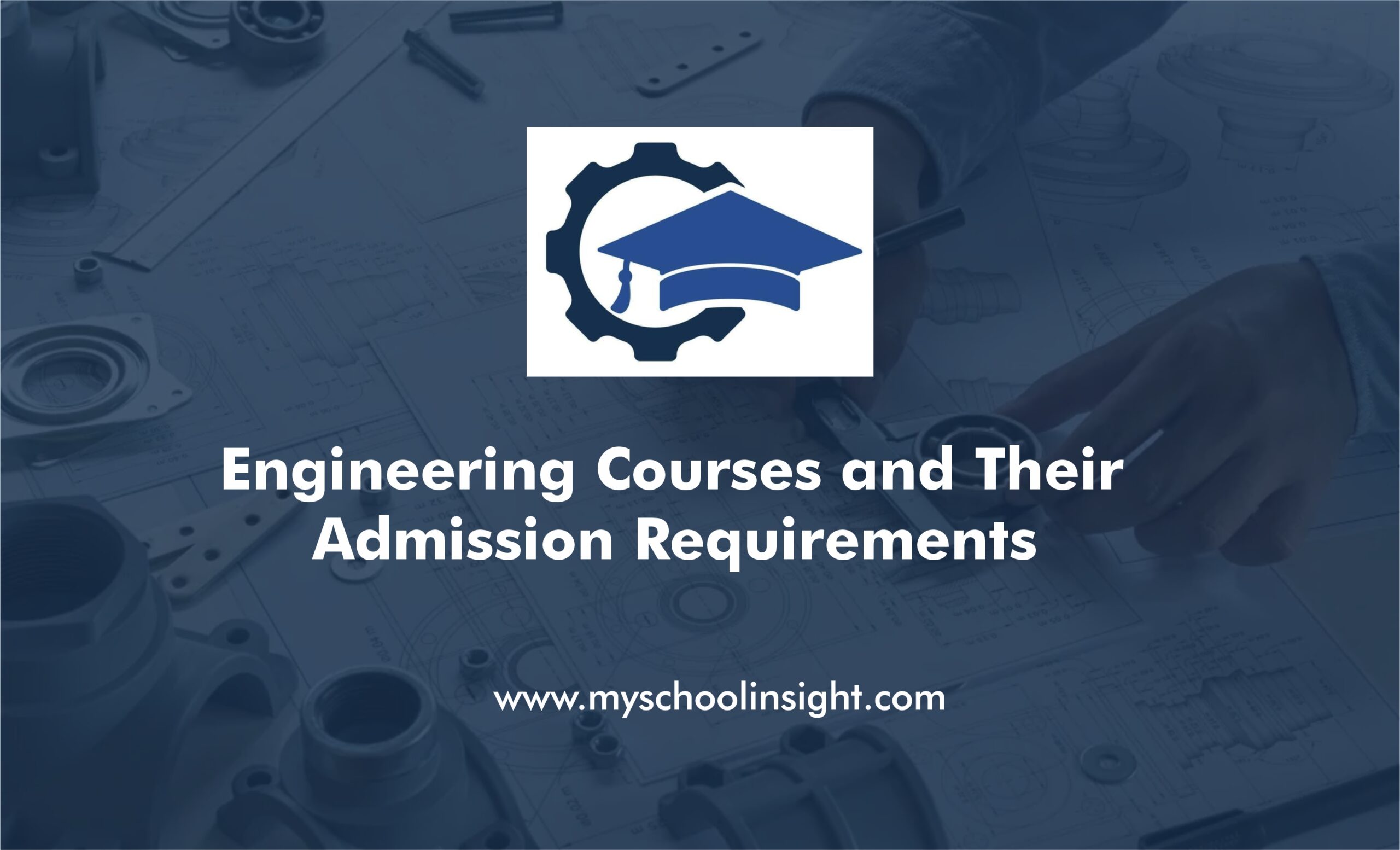Engineering Courses and Their Admission Requirements

Engineering is among the most desirable and broad focus of study in the world as it attracts students who desire to create practical solutions to the problems occurring in the world. Engineering is the core of development whether you are dreaming of designing the next generation of electric cars, developing sustainable infrastructure, or working in one of the latest technological sectors.
Nevertheless, it is necessary to have an overview of the different engineering fields and their admission criteria before immersing oneself in the exciting engineering arena because the criteria differ according to the country, university, and level of study. Whether you wish to undertake undergraduate or postgraduate course, it is important to know these requirements to enable you to fulfill the requirements and have an easy process of applying.
Understanding the Different Types of Engineering Courses
Engineering is very broad and deals with a great number of disciplines. Each field has a different aspect of technology, infrastructure or applied science. The most popular types of engineering courses along with their core subjects are to be discussed below. This will assist you in knowing the academic concentration of each course and which of them will suit your interests and career goals.
1. Mechanical Engineering
Mechanical engineering is one of the most traditional and broadest branches of engineering. It involves the design, development, and manufacturing of machinery and mechanical systems. A mechanical engineer works across many industries, from automotive and aerospace to manufacturing and robotics.
Core Subjects
- Thermodynamics: Study of heat, energy, and work. It forms the foundation for the design and analysis of engines, power plants, and refrigeration systems.
- Fluid Mechanics: Focuses on the behavior of fluids (liquids and gases) and how they interact with solid structures.
- Solid Mechanics: Involves the study of materials, stress, and strain to ensure that mechanical components can withstand operational conditions.
- Manufacturing Processes: Deals with techniques used to manufacture goods, including casting, machining, and welding.
- Control Systems: The design and management of systems that control the behavior of machines, such as in automation.
Mechanical engineers can work in various sectors like automotive, robotics, energy, and manufacturing. The problem-solving, design, and analytical skills gained in this discipline can be applied to a wide range of industries.
2. Civil Engineering
Civil engineering is the branch of engineering concerned with the design, construction, and maintenance of infrastructure such as roads, bridges, buildings, and water supply systems. It is one of the oldest and most vital engineering disciplines, focusing on improving public infrastructure for better societal living.
Core Subjects
- Structural Analysis: Understanding the behavior of structures (buildings, bridges, etc.) under various loads and conditions.
- Geotechnical Engineering: The study of the interaction between soil, rock, and structures to ensure that construction projects are stable.
- Transportation Engineering: Focuses on the planning, design, and maintenance of transportation systems such as roads, railways, and airports.
- Environmental Engineering: Involves the design of systems to protect the environment, such as water and waste treatment.
- Construction Management: Involves planning, coordination, and execution of construction projects, from budgeting to project completion.
Civil engineering is essential for building the infrastructure that supports urban development and economic growth. The demand for civil engineers is expected to remain high as cities continue to grow and evolve.
3. Electrical Engineering
Electrical engineering deals with the study and application of electricity, electronics, and electromagnetism. Electrical engineers design, develop, and maintain electrical systems, ranging from circuits and machines to large-scale power grids and renewable energy solutions.
Core Subjects
- Circuit Theory: Involves the study of electrical circuits, focusing on the analysis and design of components like resistors, capacitors, and inductors.
- Control Systems: Understanding how electrical systems can be controlled and optimized for maximum efficiency, including automation and robotics.
- Power Systems: Study of electrical power generation, transmission, and distribution, including renewable energy sources such as wind and solar.
- Electromagnetic Fields: The study of how electrical and magnetic fields interact, which is critical for designing systems like antennas and electrical motors.
- Signal Processing: Involves manipulating and analyzing signals (such as sound or images) to improve quality or extract information.
Electrical engineers play a crucial role in everything from communications and consumer electronics to power generation and automation systems.
4. Computer Science Engineering
Computer Science Engineering (CSE) combines computer science principles with electrical engineering to develop software, hardware, and networking systems. As technology continues to revolutionize every aspect of modern life, CSE offers a wide range of career opportunities in fields such as artificial intelligence, cybersecurity, and data science.
Core Subjects
- Programming: Involves learning programming languages such as Python, Java, and C++ to develop software applications and systems.
- Data Structures and Algorithms: Teaches efficient ways to store, organize, and retrieve data, critical for developing scalable software solutions.
- Database Management: Focuses on the design and management of databases, including storing and retrieving vast amounts of information.
- Computer Networks: Study of how computers communicate over networks, including protocols, security, and network architecture.
- Artificial Intelligence: Involves creating systems that can mimic human intelligence, such as machine learning algorithms, robotics, and natural language processing.
With the ever-increasing reliance on digital technologies, computer science engineers are in high demand to develop solutions that power everything from smartphones to cloud computing.
5. Chemical Engineering
Chemical engineering combines principles of chemistry, biology, physics, and mathematics to solve problems related to the production and use of chemicals, energy, food, pharmaceuticals, and materials. Chemical engineers design processes that convert raw materials into useful products on an industrial scale.
Core Subjects
- Chemical Reaction Engineering: The study of chemical reactions, catalysts, and reactors to design efficient processes for large-scale production.
- Fluid Mechanics: Focuses on the movement of fluids in industrial systems such as pipelines and reactors.
- Heat Transfer and Mass Transfer: The study of how heat and mass are transferred in chemical processes, which is vital for optimizing production and energy use.
- Process Control: Involves monitoring and controlling chemical processes to maintain desired outputs and avoid hazards.
- Biochemical Engineering: Applies chemical engineering principles to biological systems, often used in the pharmaceutical and biotechnology industries.
Chemical engineering is crucial in a wide range of industries, from pharmaceuticals to renewable energy, and plays a major role in developing sustainable solutions for the planet.
6. Aerospace Engineering
Aerospace engineering involves the design and development of aircraft, spacecraft, and related systems. Aerospace engineers work to improve the efficiency, safety, and performance of aerospace vehicles, including both commercial aircraft and military or space exploration systems.
Core Subjects
- Aerodynamics: The study of how air flows over and around objects, which is essential for designing efficient aircraft and spacecraft.
- Propulsion Systems: Focuses on engines and thrust systems used in both aircraft and spacecraft.
- Flight Mechanics: Involves understanding the behavior of aircraft during flight, including stability, control, and navigation.
- Spacecraft Design: Study of the unique challenges involved in designing spacecraft, such as weightlessness, radiation, and vacuum conditions.
- Control Systems: The design of automated systems to manage the flight behavior of aircraft and spacecraft.
Aerospace engineers play a vital role in advancing air travel, space exploration, and even defense systems.
7. Biotechnology Engineering
Biotechnology engineering merges biological sciences with engineering techniques to develop technologies that improve human life and the environment. This discipline is particularly relevant to industries such as healthcare, agriculture, and energy.
Core Subjects
- Genetic Engineering: The modification of organisms’ genetic material to enhance desired traits, such as disease resistance or improved crop yields.
- Microbiology: Study of microorganisms and their applications in fields like medicine and food production.
- Bioprocess Engineering: Focuses on the design and optimization of processes to produce biological products such as vaccines, biofuels, and antibiotics.
- Molecular Biology: Study of the molecular basis of biological activity, essential for innovations in genetics and biotechnology.
- Biochemical Engineering: Application of chemical engineering principles to biological systems, particularly in the production of bio-based products.
Biotechnology engineers work on groundbreaking solutions that impact medicine, agriculture, and the environment, making it one of the most exciting and fast-growing fields.
8. Environmental Engineering
Environmental engineering involves the design and implementation of systems that address environmental challenges such as air and water pollution, waste management, and climate change. This field aims to improve human health and the quality of the environment through sustainable solutions.
Core Subjects
- Water and Wastewater Treatment: Study of processes used to treat water and waste to make it safe for human consumption or to prevent pollution.
- Air Quality: Focus on monitoring and controlling air pollution to protect the environment and public health.
- Environmental Impact Assessment: Study of how engineering projects and industrial activities affect the environment, with a focus on mitigation strategies.
- Sustainability: Designing systems and processes that minimize environmental impact while maximizing resource efficiency.
- Solid Waste Management: Involves the collection, treatment, and disposal of solid waste materials to reduce environmental harm.
Environmental engineers are crucial in addressing the pressing global challenges of climate change, resource depletion, and pollution, making this an increasingly important field.
Admission Requirements for Engineering Courses
When applying for engineering courses, it’s essential to meet specific admission requirements to be considered for acceptance. These requirements can vary depending on the level of study (undergraduate or postgraduate), the country you’re applying in, and the university’s specific policies. Below, we’ll break down the typical admission criteria for both undergraduate and postgraduate engineering programs, along with some examples of globally recognized exams and qualifications that may be required.
Undergraduate Admission Requirements
Undergraduate engineering programs, such as a Bachelor of Science (B.Sc.), Bachelor of Engineering (B.E.), or Bachelor of Technology (B.Tech.), typically span four years and serve as the foundational degree for aspiring engineers. Admission requirements for these programs are generally structured to ensure that applicants have the academic background and skills necessary to succeed in the rigorous curriculum.
1. Educational Qualifications
To apply for an undergraduate engineering program, applicants must have completed their secondary school education or its equivalent. Specific subjects that are usually required include:
- Mathematics: A solid understanding of algebra, calculus, and geometry is vital, as mathematics is the backbone of engineering.
- Physics: Fundamental principles of mechanics, electricity, magnetism, and thermodynamics are central to most engineering fields.
- Chemistry: Often required, especially for disciplines like chemical, civil, and environmental engineering, where chemical processes play a significant role.
Many universities may also require proficiency in English, particularly in countries where English is the medium of instruction, such as in the US, UK, and Canada.
2. Minimum Marks or Grades
Most universities or engineering colleges set a minimum threshold of marks or grades that applicants must meet in their final year of secondary school. This varies from one institution to another, but a general guideline is:
- India: Students must score at least 60-70% (or equivalent) in subjects like mathematics, physics, and chemistry to be eligible for engineering courses.
- United States: Admission to engineering programs typically requires a strong high school GPA, often 3.5 and above on a 4.0 scale, with high scores in STEM subjects.
- United Kingdom: The typical entry requirement is a set of A-levels, often requiring AAB or higher in mathematics and physics.
- Australia: Most Australian universities require a high school diploma with strong performance in mathematics and science subjects.
3. Entrance Examinations
For many institutions, particularly in countries like India and the United States, entrance exams play a crucial role in the admission process. Some well-known entrance exams include:
A. Joint Entrance Examination (JEE) – India
- JEE Main and JEE Advanced are two national-level exams that students must take to gain admission to undergraduate engineering courses in India’s top universities, including the Indian Institutes of Technology (IITs) and National Institutes of Technology (NITs).
B. SAT/ACT – United States
- In the United States, most engineering schools require students to submit SAT or ACT scores as part of their application. The SAT includes sections on mathematics and reading/writing, while the ACT covers English, mathematics, reading, and science reasoning.
C. GCE A-Levels – United Kingdom
- In the UK, A-Levels (Advanced Levels) are typically required for university entry. Students must take exams in subjects relevant to engineering, such as mathematics, physics, and sometimes chemistry or further mathematics.
D. Higher Secondary School Certificate – Other Countries
- Other countries, including Australia, Canada, and various European nations, also have their own specific entrance requirements, which may include standardized tests or subject-specific exams.
4. English Language Proficiency
For non-native English speakers, proving proficiency in English is a critical part of the application process. Some widely accepted English proficiency tests include:
- TOEFL (Test of English as a Foreign Language): Many universities require a minimum score of 80-100 on the internet-based TOEFL for international students.
- IELTS (International English Language Testing System): Typically, a minimum score of 6.0 to 7.0 is required, depending on the university.
- Duolingo English Test: Some institutions now accept Duolingo scores, especially in light of the COVID-19 pandemic.
5. Personal Statement or Statement of Purpose
A personal statement or statement of purpose (SOP) is a key component of many applications. This is an opportunity for applicants to express their passion for engineering, explain why they are interested in the specific course, and describe their long-term career goals. A well-written SOP can set an applicant apart from others and demonstrate their enthusiasm and dedication to the field of engineering.
6. Letters of Recommendation
Some universities may ask for letters of recommendation from high school teachers, especially those who have taught subjects like mathematics, physics, or chemistry. These letters should ideally highlight the student’s academic abilities, work ethic, and potential for success in an engineering program.
Postgraduate Admission Requirements
Postgraduate engineering programs, such as a Master of Science (M.Sc.) or Master of Technology (M.Tech.), offer specialized training and advanced knowledge in a specific area of engineering. For those looking to pursue a Ph.D. in engineering, the application requirements are more focused on research capability and prior academic experience.
1. Educational Qualifications
- Bachelor’s Degree: A relevant undergraduate degree in engineering or a closely related field (e.g., B.Tech, B.E., B.Sc.) is generally required for entry into a postgraduate engineering program. Applicants must have a good academic standing, often requiring a minimum GPA or percentage in their undergraduate degree.
- For instance, universities in the United States typically require a GPA of 3.0 or higher for admission to graduate programs.
- In India, postgraduate admissions often require a minimum of 60-70% in the B.Tech/BE degree for entry to M.Tech courses.
2. Entrance Examinations
Many universities and institutions require postgraduate applicants to take an entrance exam, particularly for competitive programs. Some prominent entrance exams include:
A. Graduate Aptitude Test in Engineering (GATE) – India
- GATE is required for admission to M.Tech programs in India and is widely regarded as one of the most competitive exams for postgraduate engineering courses. It tests the knowledge of applicants in specific engineering disciplines, including mathematics, physics, and core subjects.
B. Graduate Record Examination (GRE) – United States
- For students applying to engineering graduate programs in the United States, the GRE is often a required exam. The test evaluates a student’s general aptitude in quantitative reasoning, verbal reasoning, and analytical writing. Some programs may waive the GRE requirement for candidates with strong undergraduate records or work experience.
C. Subject-Specific Entrance Exams
- In some countries and institutions, there may be subject-specific entrance exams, especially for highly specialized engineering fields such as Aerospace Engineering, Electrical Engineering, or Biotechnology.
3. Statement of Purpose and Research Proposal (For Ph.D.)
For Master’s programs, a statement of purpose is often required, detailing why the applicant is interested in the program, their long-term career goals, and how the specific course aligns with their academic background and interests. For Ph.D. programs, applicants must usually submit a research proposal, which outlines the research topic they wish to explore, their research objectives, and the methodology they plan to use.
4. Work Experience (For Certain Programs)
For some specialized postgraduate programs, especially in fields like Systems Engineering, Management Engineering, or Industrial Engineering, work experience can be a valuable asset. Many institutions may require applicants to have a certain number of years of professional experience in a relevant engineering field before they can apply.
5. Letters of Recommendation
Most postgraduate programs require applicants to submit letters of recommendation from previous professors or industry professionals who can vouch for their academic performance, research potential, and professional experience. These letters should highlight the applicant’s problem-solving skills, technical abilities, and readiness for advanced study.
6. Interview Process
In some cases, especially for Ph.D. programs or highly competitive postgraduate courses, applicants may be required to attend an interview. The interview serves as an opportunity for the admissions committee to assess the applicant’s research interests, academic background, and fit for the program. It may also include a discussion of the applicant’s previous work, research ideas, or projects.
Conclusion
Engineering is a demanding and fulfilling profession and provides many career opportunities across a broad field of technology, infrastructure, health, and energy. Being an Engineer hopeful, it is important to know well the subjects offered and the exact requirements that the programs one wishes to undertake in terms of admission.
Applicants of undergraduate degree or those hoping to join a postgraduate course must meet the admission criteria to guarantee success in the application. Also, be certain to gather the requirements of every institution and program, succumb to the required entrance examinations, and submit all the needed documents, such as test results, recommendations, and personal statements.
The road to achieving the goal of becoming an engineer cannot be easily reached, however, it can happen with preparation and concentration, you will reach your goal and make a substantial difference in the field of technology and innovations. Therefore, the sooner the better, the more focused an individual will be and the first step towards the creation of your future as an engineer will be made!





